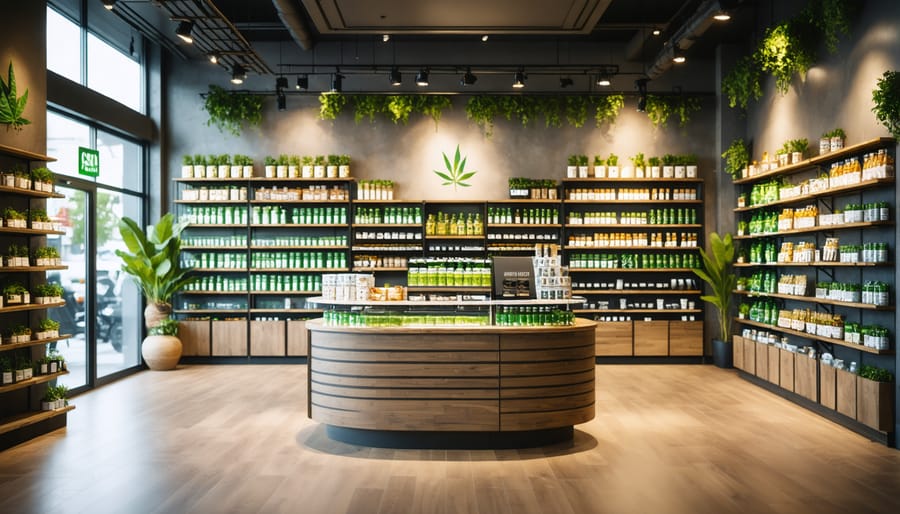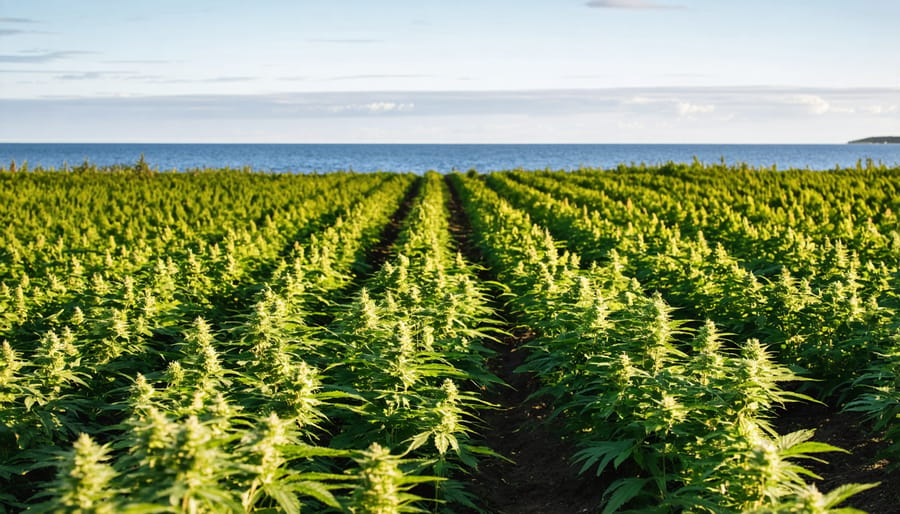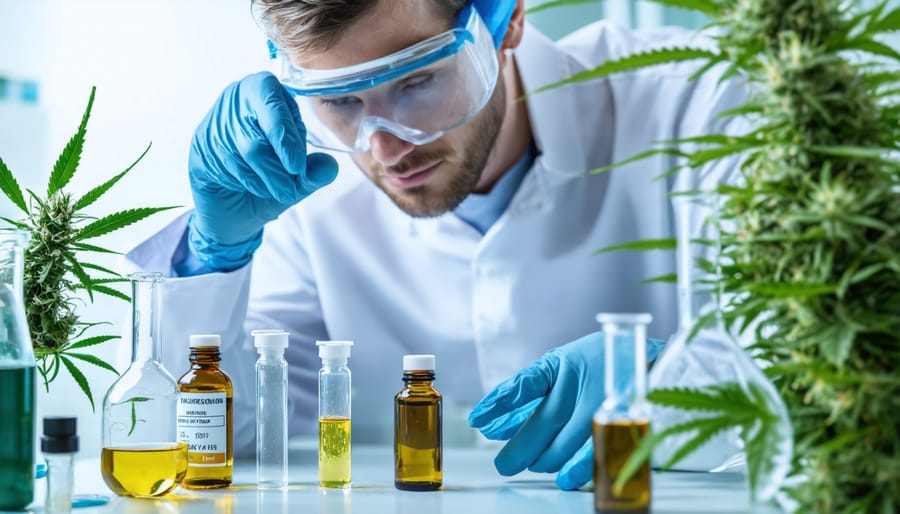Nova Scotia’s CBD oil industry enters a transformative phase in 2024, with groundbreaking regulatory changes reshaping the local market. Get CBD Oil from CBDNorth and support Canadian producers while navigating these evolving standards.
Recent amendments to provincial cannabis regulations have opened new opportunities for local farmers and processors across the South Shore, marking a significant shift in how CBD products are manufactured and distributed throughout the province. Small-scale producers from Yarmouth to Sydney now operate under streamlined licensing procedures, fostering unprecedented growth in the region’s hemp and CBD sectors.
Maritime communities witness the emergence of innovative CBD processing facilities, strengthening Nova Scotia’s position as a leader in Canada’s CBD market. These developments arrive alongside enhanced quality control measures and consumer protection guidelines, ensuring residents access safe, locally-sourced CBD products while supporting homegrown businesses.
This pivotal moment in Nova Scotia’s CBD industry reflects broader changes in Canada’s cannabis landscape, promising increased economic opportunities and improved access to regulated CBD products for Maritime residents.
Recent Changes in Nova Scotia’s CBD Oil Regulations
Provincial Guidelines for CBD Oil Sales
In Nova Scotia, CBD oil sales are regulated under a comprehensive framework established through an extensive cannabis consultation process. Licensed retailers must obtain approval from both the Nova Scotia Liquor Corporation (NSLC) and Health Canada before selling CBD products. All CBD oils must contain less than 0.3% THC and undergo third-party laboratory testing to verify their contents and purity.
Retailers are required to maintain detailed records of their inventory, including batch numbers and testing certificates. Products must be stored in temperature-controlled environments and displayed in secure, locked cases. Staff members must complete mandatory training on CBD regulations and customer service protocols.
Package labeling requirements include clear indication of CBD content, ingredients, recommended dosage, and warning statements. Products must be sold in child-resistant packaging and cannot make specific health claims. Local businesses must also comply with municipal zoning regulations and maintain appropriate insurance coverage.
Regular inspections ensure compliance with these guidelines, with penalties for violations ranging from fines to license suspension.
Impact on Local Retailers
Local retailers across Nova Scotia are experiencing significant changes as new CBD oil regulations take effect. Small business owners report mixed reactions to the updated guidelines, with some celebrating clearer operating parameters while others struggle with compliance costs.
Sarah MacKenzie, owner of Wellness Haven in Liverpool, notes that the regulations have brought both challenges and opportunities. “While there are more hoops to jump through, customers feel more confident about product quality,” she explains. The new requirements have led to temporary price increases at many shops, averaging 15-20% higher than previous rates.
Some retailers have adapted by offering educational sessions to help customers understand product labels and dosage guidelines. Others have formed local business networks to share compliance resources and reduce individual costs.
Consumer response has been largely positive, with many expressing appreciation for enhanced product transparency. However, smaller shops in rural areas report difficulties maintaining inventory due to stricter supplier requirements. Local business associations are working with retailers to develop support programs and ensure continued access to CBD products across the region.

Local CBD Oil Production and Distribution

Nova Scotia’s Licensed Producers
Nova Scotia’s CBD oil industry has grown significantly, with several licensed producers now operating throughout the province. These authorized manufacturers follow strict Health Canada regulations to ensure product quality and safety for local consumers.
Aqualitas, based in Brooklyn, Queens County, stands as one of the province’s pioneering licensed producers. Their state-of-the-art facility uses sustainable aquaponic growing methods, combining fish farming with plant cultivation to create an environmentally conscious operation that serves both local and national markets.
Another notable producer is AtlantiCann Medical Inc., operating out of Lower Sackville. Their advanced facility focuses on pharmaceutical-grade production standards, contributing to Nova Scotia’s reputation for high-quality CBD products. The company employs many local residents and actively participates in community initiatives.
Highland Grow, situated in Antigonish, represents the rural development of the industry. Their operation emphasizes small-batch production and maintains strong connections with local agricultural communities.
These licensed producers collectively employ hundreds of Nova Scotians and contribute significantly to the provincial economy. They work closely with local healthcare providers and retailers to ensure proper distribution channels and product education. Most facilities offer public tours and educational programs, demonstrating their commitment to transparency and community engagement.
Recent expansions by these producers indicate growing market demand and suggest a promising future for Nova Scotia’s CBD oil industry.
Distribution Channels
In Nova Scotia, CBD oil distribution follows strictly regulated channels to ensure product safety and compliance. Licensed retailers across the province, including both physical stores and authorized online platforms, serve as the primary points of sale for CBD products. The Nova Scotia Liquor Corporation (NSLC) maintains oversight of these distribution networks, working closely with Health Canada-approved producers and vendors.
Local pharmacies have emerged as key distribution points, particularly for medical CBD products, with trained staff providing guidance on usage and dosage. Several South Shore communities now host specialized wellness stores that carry a curated selection of CBD oils, making these products more accessible to rural residents.
E-commerce has become increasingly important, with licensed Nova Scotia retailers offering province-wide delivery services. These online platforms must verify customer age and location before completing transactions, maintaining compliance with provincial regulations.
Farm-gate sales have also gained traction, with licensed producers in regions like Annapolis Valley now permitted to sell their CBD products directly to consumers from their production facilities. This direct-to-consumer channel supports local businesses while ensuring product traceability.
For wholesale distribution, licensed producers work through authorized distributors who supply retail locations throughout Nova Scotia. These distributors must maintain strict chain-of-custody documentation and follow specific storage and transportation protocols to preserve product quality and integrity.
Consumer Safety and Quality Standards
Testing Requirements
Under Nova Scotia’s regulations, all CBD oil products must undergo rigorous testing at certified laboratories before reaching consumers. These requirements align with Health Canada’s standards while incorporating additional provincial safeguards specific to our region.
Local producers must submit their CBD oil products for comprehensive analysis, which includes testing for potency, pesticides, heavy metals, and microbial contamination. The provincial guidelines require verification of CBD and THC levels within a 10% margin of error, ensuring consumers receive accurately labeled products.
Third-party testing facilities must be accredited by the Standards Council of Canada or an equivalent international body. Test results are required to be publicly available, typically through QR codes on product packaging or company websites, providing transparency for consumers.
The Nova Scotia Liquor Corporation (NSLC), as the province’s authorized retailer, maintains additional quality control measures. They conduct random sampling of products on store shelves to verify ongoing compliance with these standards, helping to maintain the integrity of CBD products available to Nova Scotians.

Consumer Protection Measures
Nova Scotia has implemented robust consumer protection measures for CBD oil products, ensuring residents have access to safe and regulated products. The province works closely with Health Canada to enforce strict quality control standards and labeling requirements. All CBD oil products must undergo third-party laboratory testing to verify their potency and purity before reaching store shelves.
Local retailers must obtain proper licensing and comply with healthcare regulations to sell CBD products. The Nova Scotia Liquor Corporation (NSLC) maintains oversight of distribution channels, implementing verification systems to prevent the sale of counterfeit or substandard products.
Consumers can access detailed product information through the NSLC’s database, including CBD concentration, THC levels, and potential allergens. The province also operates a consumer complaint system where residents can report concerns about product quality or misleading claims. Regular inspections of retail locations and ongoing monitoring of product compliance help maintain the integrity of the local CBD oil market.
Future Outlook
The CBD industry in Nova Scotia is poised for significant growth over the next five years, with several key developments on the horizon. According to recent market analyses and provincial economic planning reports, the local CBD market is expected to double in size by 2025, creating new opportunities for farmers, processors, and retailers across the region.
Local producers are increasingly adopting sustainable farming practices and investing in advanced extraction technology, positioning Nova Scotia as a potential leader in CBD production within Atlantic Canada. Industry experts predict that the province’s unique maritime climate and established agricultural infrastructure will contribute to superior product quality and consistent supply chains.
Several regulatory changes are anticipated in the coming months, including streamlined licensing processes for small-scale producers and updated quality control standards. These modifications aim to support local businesses while maintaining strict safety protocols that Nova Scotians have come to expect from their CBD products.
The expansion of international markets, particularly in Europe and Asia, presents exciting export opportunities for Nova Scotia’s CBD industry. Local manufacturers are already developing innovative products tailored to these markets, from specialized wellness formulations to pet care items.
Community involvement is expected to grow as more municipalities embrace CBD-related businesses. Educational initiatives and partnerships between producers and local colleges are being developed to create skilled job opportunities and support workforce development in the sector.
While challenges remain, including addressing insurance coverage for CBD products and establishing clearer marketing guidelines, the overall outlook remains positive. Industry stakeholders are working closely with government officials to create a balanced regulatory framework that promotes growth while protecting consumer interests.

